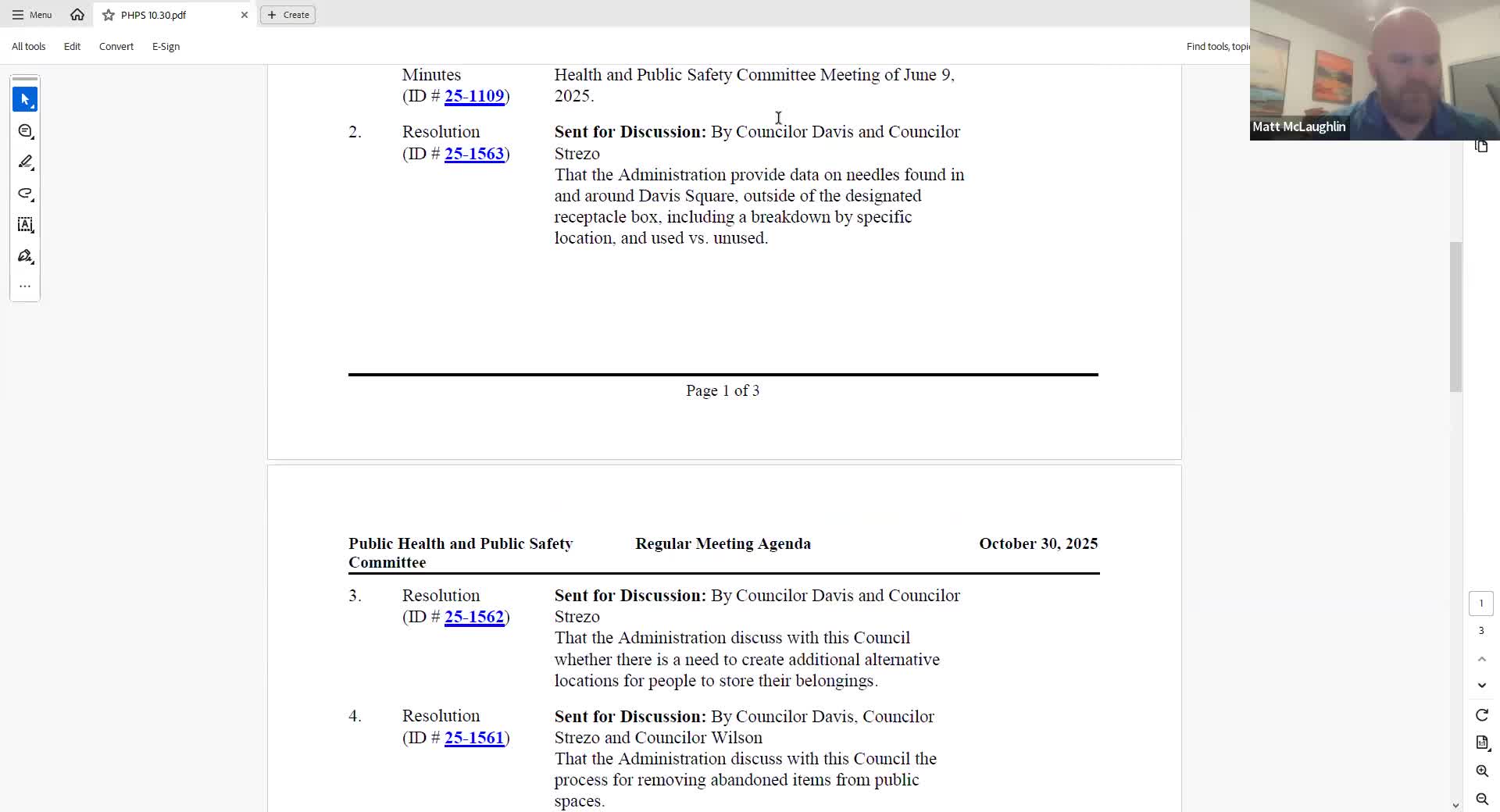Somerville staff outline storage, disposal and outreach plans for Davis Square amid rising public concerns
Get AI-powered insights, summaries, and transcripts
Subscribe
Summary
Somerville City officials told the Public Health and Public Safety Committee on June 9 that they are pursuing short- and long-term solutions to address needles, unattended personal belongings and storage needs in and around Davis Square.
Somerville City officials told the Public Health and Public Safety Committee on June 9 that they are pursuing short- and long-term solutions to address needles, unattended personal belongings and storage needs in and around Davis Square.
The committee heard that a memo and a spreadsheet summarizing needles and sharps collected by Inspectional Services Department staff were provided to committee members. Nikki Spencer, chief of staff, said the city currently uses a small DPW container to hold items removed on an urgent basis but that "the short answer is yes, and there is a need" for larger, more regular storage options for bulkier belongings.
Spencer said the city is pursuing two tracks: an immediate, larger-capacity storage option that would allow departments to secure survival items when they must be removed, and a longer-term model of regularly accessible lockers or storage run by a city contractor or nonprofit partner. She listed requirements for a successful program: adequate space, staffing or supervision, clear rules on prohibited or hazardous items (for example, perishables, pests or sharps), and policies for unclaimed property.
Liaison Hutter and other staff described the city’s current triage for unattended items. The first step is safety: items that present biohazards, sharps, weapons, rotting perishables or a fire risk are removed immediately. The city also weighs location sensitivity — such as schoolyards or playgrounds — and whether the volume of items blocks egress. When items can be stored safely, staff attempt to identify an owner and reunite belongings through outreach partners rather than discard them outright.
Councilor Davis said he raised the issue to establish facts and to clarify whether the mayor’s direct approval is required to remove items in a spot such as the porta-potty near 7 Hills. Staff responses emphasized that some items clearly require immediate removal for safety reasons, while other items require outreach and a short period of investigation to determine whether they are truly abandoned.
Andy Benvenuto, community health worker manager, described the city’s street outreach team. Benvenuto said the team includes four community health workers and reported "150 plus total client encounters" in September and October alone; encounters may include multiple contacts with the same individual and can involve case assistance such as SNAP or MassHealth applications, referrals, and supply distribution. Benvenuto said outreach occurs at least three days a week (two regular days in Davis Square), that the city coordinates with Somerville Homeless Coalition, Fenway Health and other providers to avoid duplication, and that the team has multilingual capacity in English, Spanish, Portuguese, Haitian Creole and Arabic.
On harm reduction, Benvenuto said staff hand out personal sharps containers and supplies, have produced stickers showing kiosk locations in Davis Square, and are running a "Be a Good Neighbor" informational campaign outlining safe disposal options.
Committee members were encouraged to continue using the 3-1-1 system to file reports so the city can triage and track follow-up. After questions about data and next steps, the committee marked the related agenda items (needles data, storage options, abandoned items policy and an outreach update) as "work complete," while noting staff follow-up and the option to reopen work if members want further detail.
What’s next: staff said they are researching models and possible sites for additional storage, continuing interagency work on protocols for handling belongings and hazardous items, and will provide data when requested by councilors. Councilors said they may follow up on specific data points and local sites (for example, the use of a city-owned former church building for limited storage had been discussed informally).
